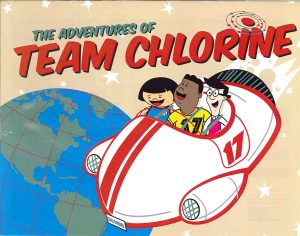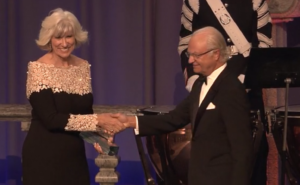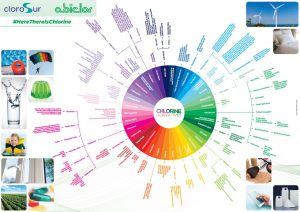Receive Email Updates
In September 2015, the new UN Agenda for Sustainable Development was adopted, coming into force on 01 January 2016. The 17 Sustainable Development Goals (SDGs) contain a very important one, SDG #6 (Sustainable management of water and sanitation for all) which is of direct relevance to chlorine. The importance of SDG #6 was highlighted during the 2016 World Water Week, which this year took place on 27 August – 01 September.
Despite some progress in achieving the SDGs being made, the UN Secretary General report of June 2016, highlighted that some areas for improvement still remain. For example by 2030, 663 million people could still have no access to an improved water source and 2.4 billion people may still have no access to improved sanitation. This must change over the next 15 years and efforts to do this have begun by making the SDG indicators more specific and measurable.
It is here that chlorine plays a vital role! For example, the SDG indicators call for improved drinking water sources that are located on the premises, available when needed and compliant with water quality standards.
Chlorine is already well known to be a powerful tool in providing such safe supplies. For example, in 2012 “Rapid Assessment of Drinking-water Quality: A Handbook of Implementation” (WHO/UNICEF) recommended the use of the chlorine residual of ≥ 0.2 mg/l as a key parameter to check for in all samples from disinfected supplies (e.g. at treatment works, in distribution and in households). This residual helps to protect the microbial quality of the water in distribution and storage in order to safeguard human health.
This residual is not the only benefit of using chlorine though. Chlorine’s affordability and proven, effective nature, alongside it’s scalability and ease of measurability using simple test-strips will all contribute to achieving the UN SDGs over the coming years.
Indeed, such positive impacts are already seen in Haiti, where a network of ‘Chlorine Banks’ is helping to protect over 900,000 people in rural communities from fatal waterborne diseases like cholera for as little as 20₵ per family per month!
CLOROSUR is pleased to invite you to participate in the X International Technical Seminar and Table Top Expo to be held on November 16 – 18, 2016 in Buenos Aires/Argentina. Back-to-back with the Technical Seminar, on Friday, November 18 the World Chlorine Council Global Safety Team (WCC GST) will hold its Safety Workshop focused on Process Safety Management (PSM).
Parallel to the CLOROSUR Technical Seminar and WCC Safety Workshop, a Table Top Expo featuring technology suppliers, materials and equipment manufacturers, as well as companies that provide services to the Chlor-alkali industry will allow participants to meet their representatives.
In addition to the technical sessions and exposition, participants that are interested will be able to visit CLOROSUR member company TRANSCLOR facilities located at Pilar, 40 km from Buenos Aires on Wednesday morning November 16. CLOROSUR will provide ground transportation from the Hilton Hotel to the plant and back. On the evening of the 16th a Welcome Cocktail will be held by the Hotel’s pool.
The entire program above will take place at the HOTEL HILTON in Buenos Aires/Argentina, with accommodation available at a special rate for participants.
If you have any question please contact Martim A. Penna at mpenna@clorosur.com.br or Mrs. Lucimara Murakami at lucimara@clorosur.com.br, phone number (55 11) 2148-4780 and Meaghan Groah at Meaghan_Groah@americanchemistry.com, phone number (O: 202-249-6716 – C: 717-333-1495).
September 26 marked the 108th anniversary of the first continuous use of chlorine to disinfect a public drinking water supply in the United States, notes a Water Quality & Health Council (WQ&HC) Perspectives article (September 23). In an extensive feature story, the WQ&HC notes that in 1908, “chlorine chemistry’s germ-defeating properties were demonstrated in drinking water in two very different settings in the United States. ”First, a test of chlorination improved the quality of animal feed water, drawn from a highly polluted stream in Chicago’s Union Stockyards”, states the story. “Days later, in Jersey City, chlorinated water was supplied for the first time on a permanent basis to a large U.S. municipality. The results included a dramatic decline in the local typhoid fever rate and a water supply that, according to a 1928 sanitary engineering report, ‘is not only of a high sanitary quality, but…it compares favorably with the best in the country,’” according to the story. “Good news traveled quickly and within a decade, drinking water chlorination spread to nearly every large city in the country. It has been called ‘a tremendous boon in the safeguarding of public health all over the world and is probably the most important and efficient sanitary measure of protection ever introduced.’” Contact: Mary Ostrowski, 1-202-249-6705.
 A fun and colourful new activity book and website were released today by the Chlorine Chemistry Division of the American Chemical Council.
A fun and colourful new activity book and website were released today by the Chlorine Chemistry Division of the American Chemical Council.
Designed by Meaghan Groah of the ACC, this wonderful new book and website is for children of all ages. It helps to educate on how chlorine is a positive part of our daily lives that is present in important products and applications from all over the world. From solar panels to herbicides, modern plastics to protecting metal, the book is full of exciting stories that everyone can enjoy. You can even try learning about chlorine whilst colouring in the pictures online!
Check out the exciting adventures of Team Chlorine via the website teamchlorine.org!
 Over 3,000 scientists, government officials and policy experts representing 120 countries gathered in Stockholm 28 August – 2 September 2016 for the 26th annual World Water Week conference. Organized by the Stockholm International Water Institute, World Water Week is “the annual focal point for the globes’ water issues,” according to the Institute’s website. A highlight of the week was the presentation by H.M. Carl XVI Gustaf, King of Sweden, of the Stockholm Water Prize to Water Quality & Health Council member, Professor Joan B. Rose.
Over 3,000 scientists, government officials and policy experts representing 120 countries gathered in Stockholm 28 August – 2 September 2016 for the 26th annual World Water Week conference. Organized by the Stockholm International Water Institute, World Water Week is “the annual focal point for the globes’ water issues,” according to the Institute’s website. A highlight of the week was the presentation by H.M. Carl XVI Gustaf, King of Sweden, of the Stockholm Water Prize to Water Quality & Health Council member, Professor Joan B. Rose.
Professor Rose, an original member of the 25-year old Council, is a Michigan State University microbiologist and world expert on the protozoan parasite Cryptosporidium. As a co-founder of the ambitious Global Water Pathogen Project, Professor Rose organized over 100 scientists from around the world into nine expert teams to address key fecal pathogen groups and the measures necessary to control those pathogens. The project will feature an online “open access integration platform” that will be updated regularly by the experts. Using the online tool, engineers and scientists working anywhere in the world will be empowered to tap into the best available science for reducing human exposure to fecal pathogens.
The UN is working to prevent an outbreak of deadly cholera in South Sudan; an area which has been in crisis since late 2013.
It is suspected that at the moment, nearly 150 people in South Sudan already have cholera. Many people area already in refugee camps but wider access to safe, clean drinking water is still difficult due to the conflict. Whilst UNICEF is delivering safe drinking water, it is challenging to provide medical supplies, sanitation and to raise community awareness, all of which are also essential in preventing an epidemic.
In an attempt to protect the population of the South Sudan as a whole, the UN Mission (UNMISS) and their partners are continuing to supply daily water supplies. This water is treated with chlorine in order to disinfect the water and keep it free from harmful microorganisms, such as those that cause cholera.
This year there have been many high-profile flooding events in North America, Europe and South Asia. Alongside the terrible loss of human life and property, it is essential that the clean-up begins soon after the event to prevent further loss of life due to water-borne disease.
According to a recent article by the Water Quality and Health Council (WQ&HC), it should be assumed that all flood waters are contaminated with such diseases. As such, once the flood waters have been removed and the affected areas are dry and clear of surface dirt/ debris, a disinfecting solution of water and chlorine bleach should be used. Wearing gloves and protective equipment should also help protect people from flood water splashes and subsequent disease whilst cleaning.
The WQ&HC recommend that the bleach solutions should contain 3/4 cup (~150 ml) regular strength chlorine bleach or 1/2 (~120ml) cup concentrated bleach to one US gallon (around 3.8 l of water) to disinfect walls, floors and other surfaces. Leaving such surfaces wet for at least 10 minutes will help correct disinfection. Also replacing the bleach solution as it becomes cloudy will help reduce the chance of microbial contamination.
The American Chemistry Council’s Chlorine Chemistry Division (CCD) traveled to Dallas, Texas to participate at the largest eco expo in the world. Tens of thousands of people gathered over the three-day public festival that aims to raise environmental awareness through innovation and progressive action.
More than 500 exhibitors gathered to share environmental-friendly knowledge and best practices from an array of platforms including the academic and government sectors. In 2015 the event’s media outreach garnered 23.2 million impressions from television, online, print and radio ads. The festival is free to both exhibit and attend.
CCD brought the fun back to chemistry with an experiment to demonstrate an endothermic reaction by making a cold pack using baking soda and citric acid. Children and adults of all ages learned the value of our industry and its innovations for a sustainable future.
In addition to participating in a popular chemistry experiment, kids and their parents took home thousands of Team Chlorine activity books. It was a tremendous success by showing attendees of all ages how chlorine chemistry drives progress on every front, including the environment, every single day. For example, few attendees knew that chlorine chemistry plays a surprisingly vital role in the production of solar panels and windmill turbine blades. And few knew that chlorine chemistry plays a surprising role in development of crop protection materials that supply a healthy and abundant food supply for families around the world.
You can learn more about the surprising role chemistry plays in everyone’s lives every day by visiting www.elementofsurprise.org.
 Chlorine and its co-product, caustic soda are applied in many essential substances and products that we rely on in our daily lives. From well known uses like water disinfection, through essential products like PVC to various intermediates in nylon and silicon production; chlorine and its co-products make our lives better.
Chlorine and its co-product, caustic soda are applied in many essential substances and products that we rely on in our daily lives. From well known uses like water disinfection, through essential products like PVC to various intermediates in nylon and silicon production; chlorine and its co-products make our lives better.
This is outlined in a set of excellent, colourful publications from South American, WCC member organisation Clorosur with input from Brazilian group Abiclor. These publications describe the essential uses of the substances as well as some general information on our industry.
Information is available on CHLORINE and CAUSTIC SODA; for further information and to download the brochures in English, Spanish or Portuguese:, check out the Clorosur website .
 A very successful technology conference was held in Moscow on 05 and 06 April 2016 on the theme of ‘Chlorine and its derivatives 2016: Best Available Techniques’.
A very successful technology conference was held in Moscow on 05 and 06 April 2016 on the theme of ‘Chlorine and its derivatives 2016: Best Available Techniques’.
More than 140 people from the Russian Federation, Belarus, Kazakhstan, China, India and Europe attended the special tenth anniversary RusChlor conference to discuss items including the industrial production of chlorine and its derivatives, to share information on how to safely transport chlorine and the raw commodities, equipment and instruments that are used in chlor-alkali production.
Arranged in co-operation between WCC member RusChlor, the JSC National Chlorine Safety Centre, the Russian Federation Ministry of Industry and Trade, Federal Service for Ecological, Technological and Atomic Supervision as well as the Russian Chemists Union; over 78 legal entities were represented from state-owned and private companies, government agencies, trade associations, engineering companies and scientific organisations.
The main technological and safety challenges to the industry were presented alongside information on those Best Available Techniques (BAT). A highlight of the event was the open discussion on safe transportation of chlorine, something which the WCC follows very closely.
For further information on the event contact jagud@chlorcentre.ru